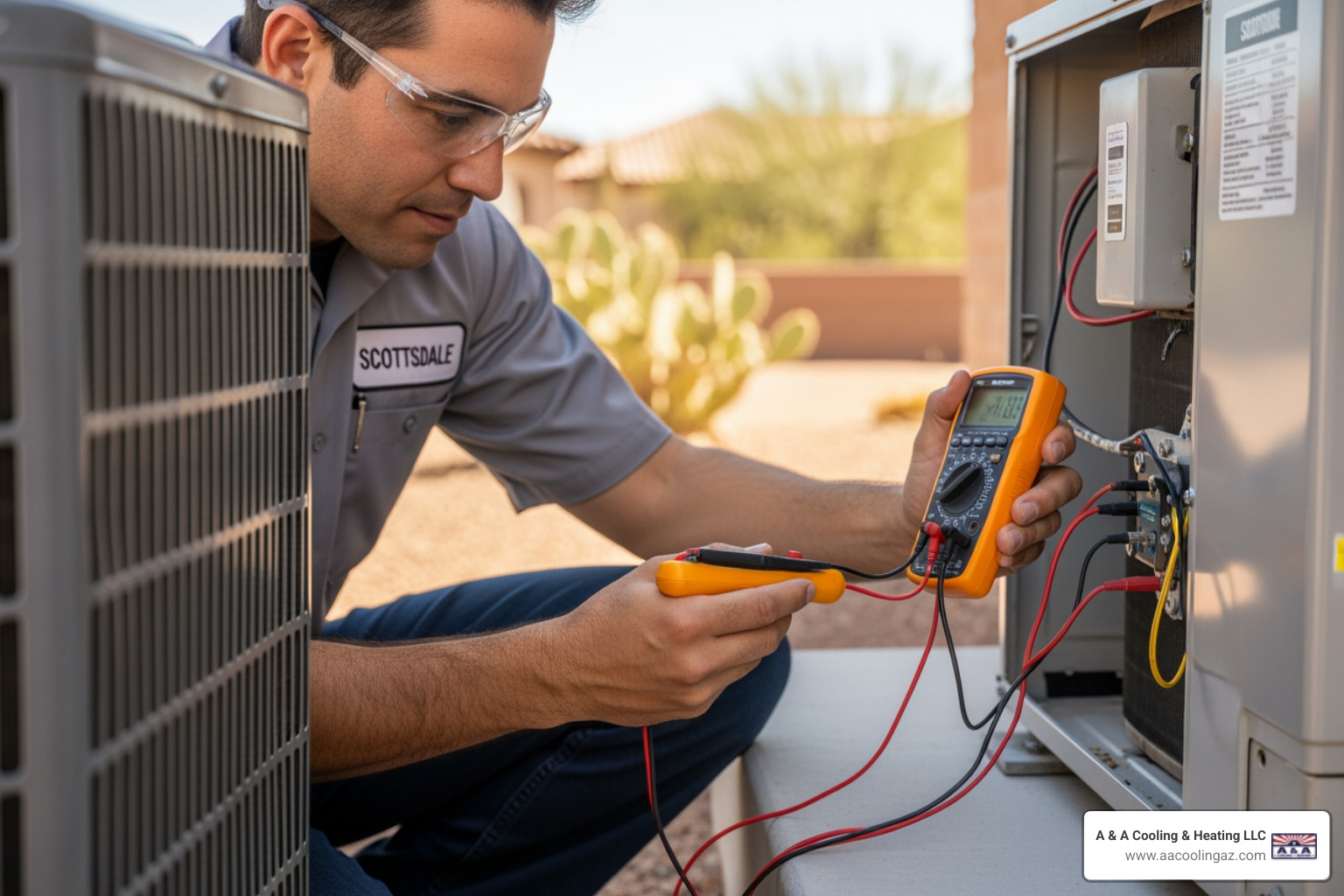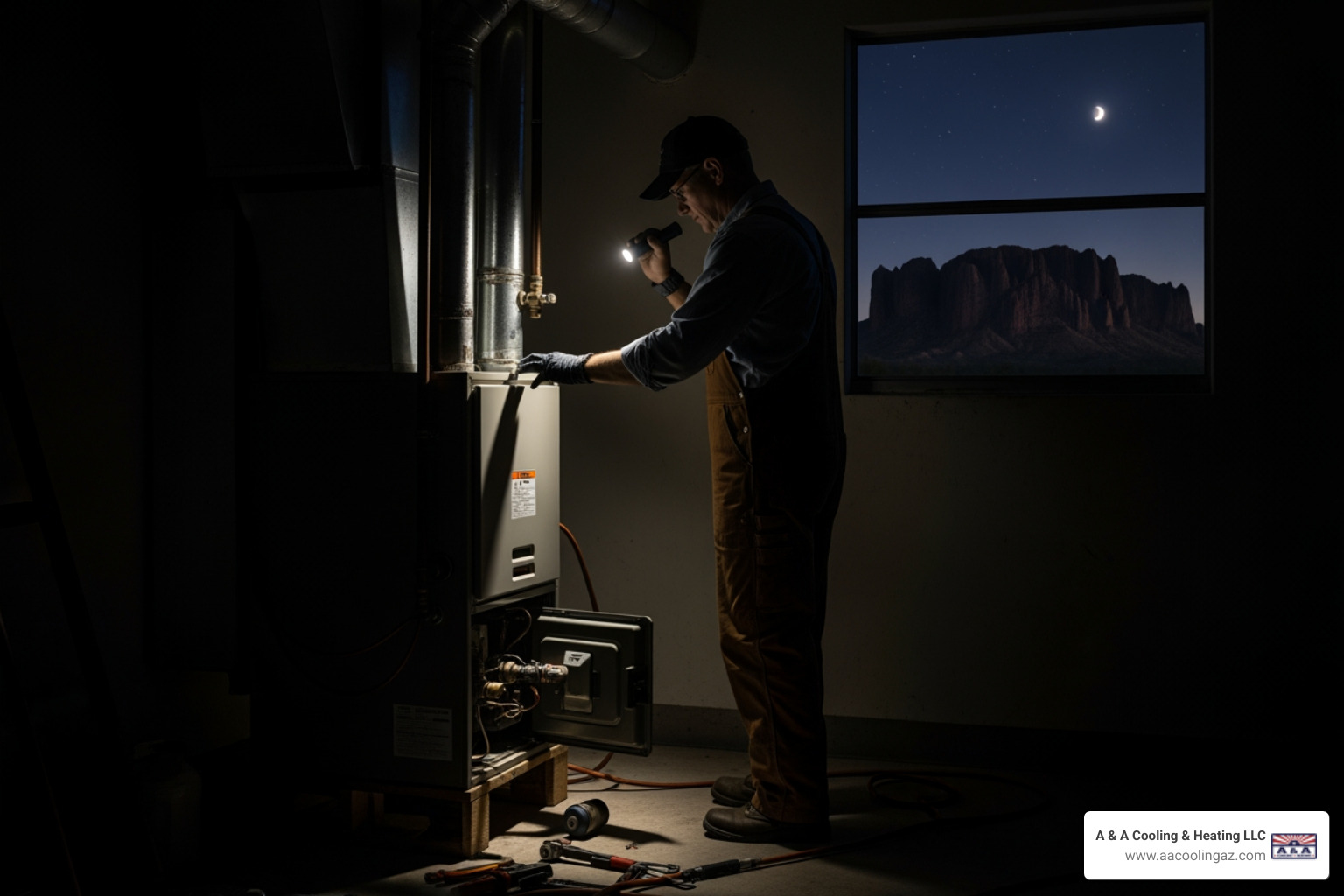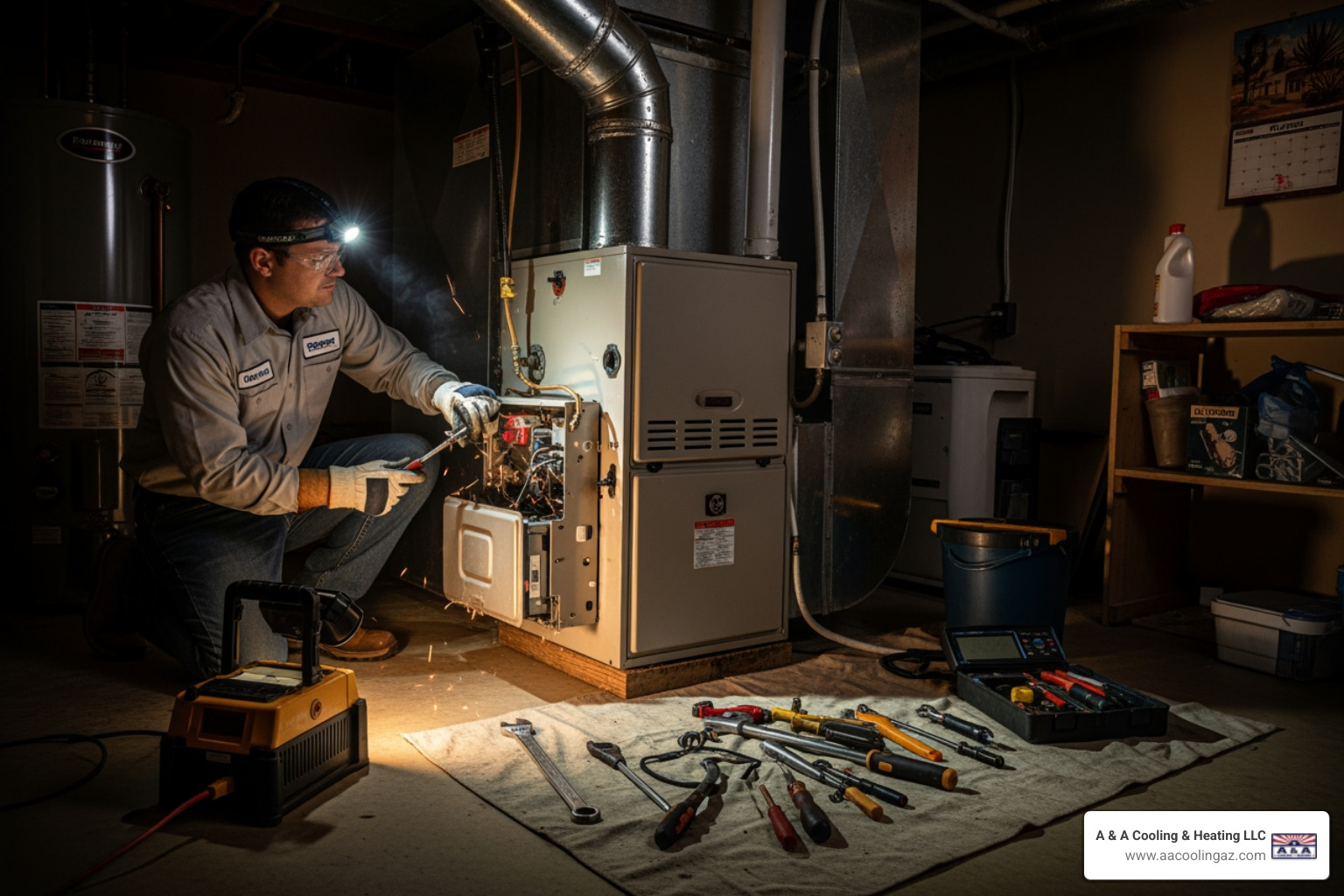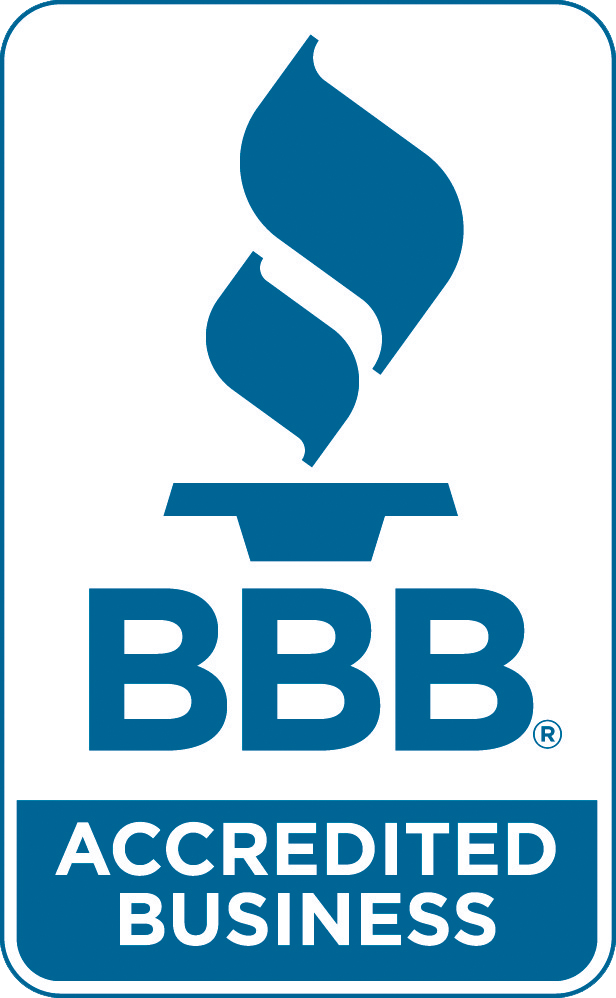Compressor Conundrum: Get Your AC Blowing Cold Again!
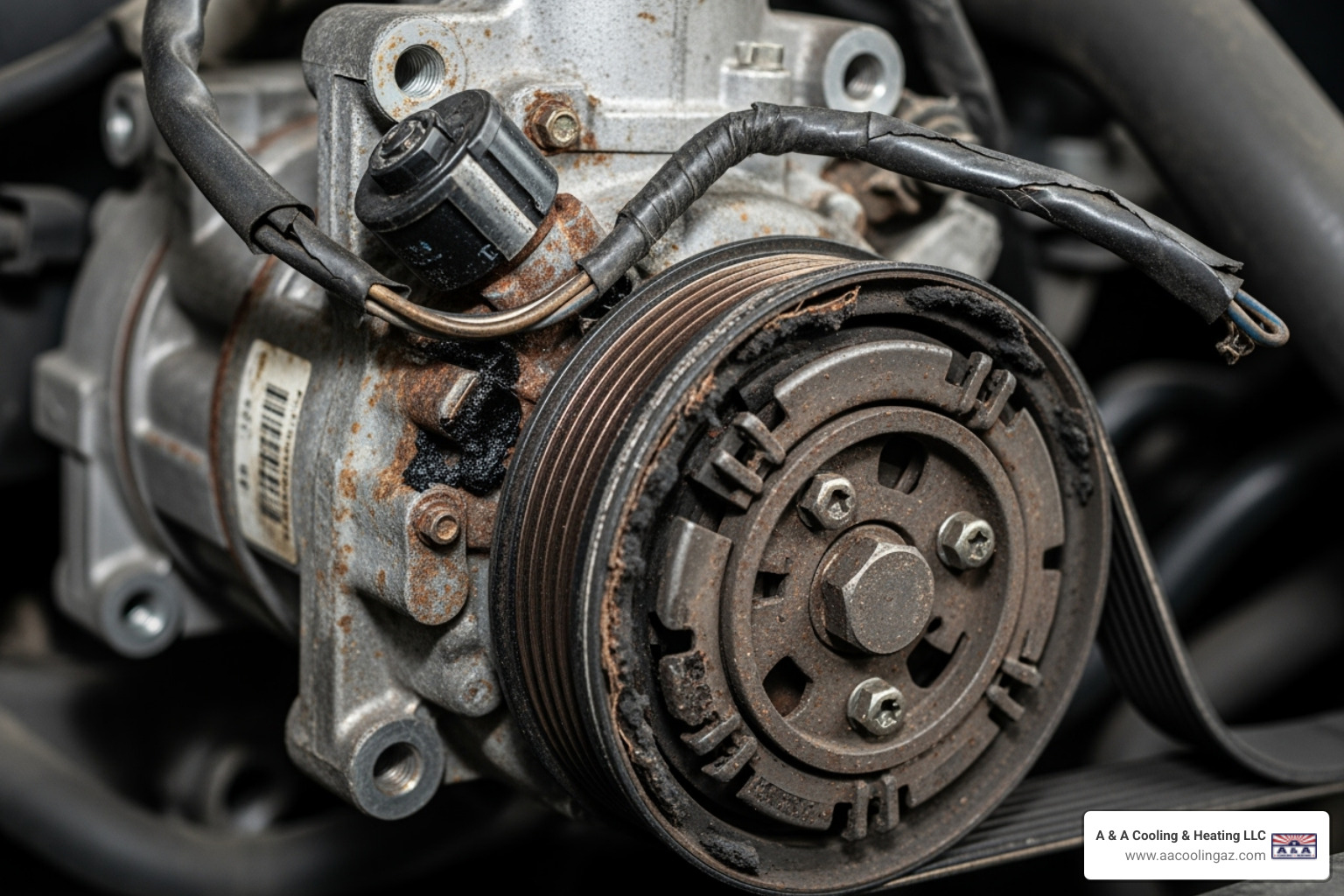
When Your AC Compressor Stops Working in Arizona's Heat
AC compressor not working is one of the most frustrating problems you can face during Arizona's brutal summer months. Nothing is worse than finding your air conditioning isn't working in the oppressive heat of summer, especially when temperatures in Apache Junction regularly soar above 110°F.
Quick Answer: Common causes of AC compressor failure include:
- Electrical issues - blown fuses, bad capacitors, tripped breakers
- Refrigerant problems - leaks, low levels, or overcharged system
- Mechanical failure - worn bearings, damaged windings, seized compressor
- Dirty components - clogged condenser coils, blocked airflow
- Age - compressors typically last 10-15 years with proper maintenance
Your AC compressor acts like the heart of your cooling system. Located in the outdoor unit, it squeezes refrigerant molecules together and pumps them through your system to absorb heat from inside your home and release it outside.
When the compressor fails, your entire cooling system stops working. The fan might still run, but you'll only get warm air from your vents. This leaves your family sweating in dangerous heat while your energy bills skyrocket.
The good news? Many compressor problems have warning signs you can spot early. Some issues have simple fixes you can try yourself, while others require professional help to avoid making things worse.
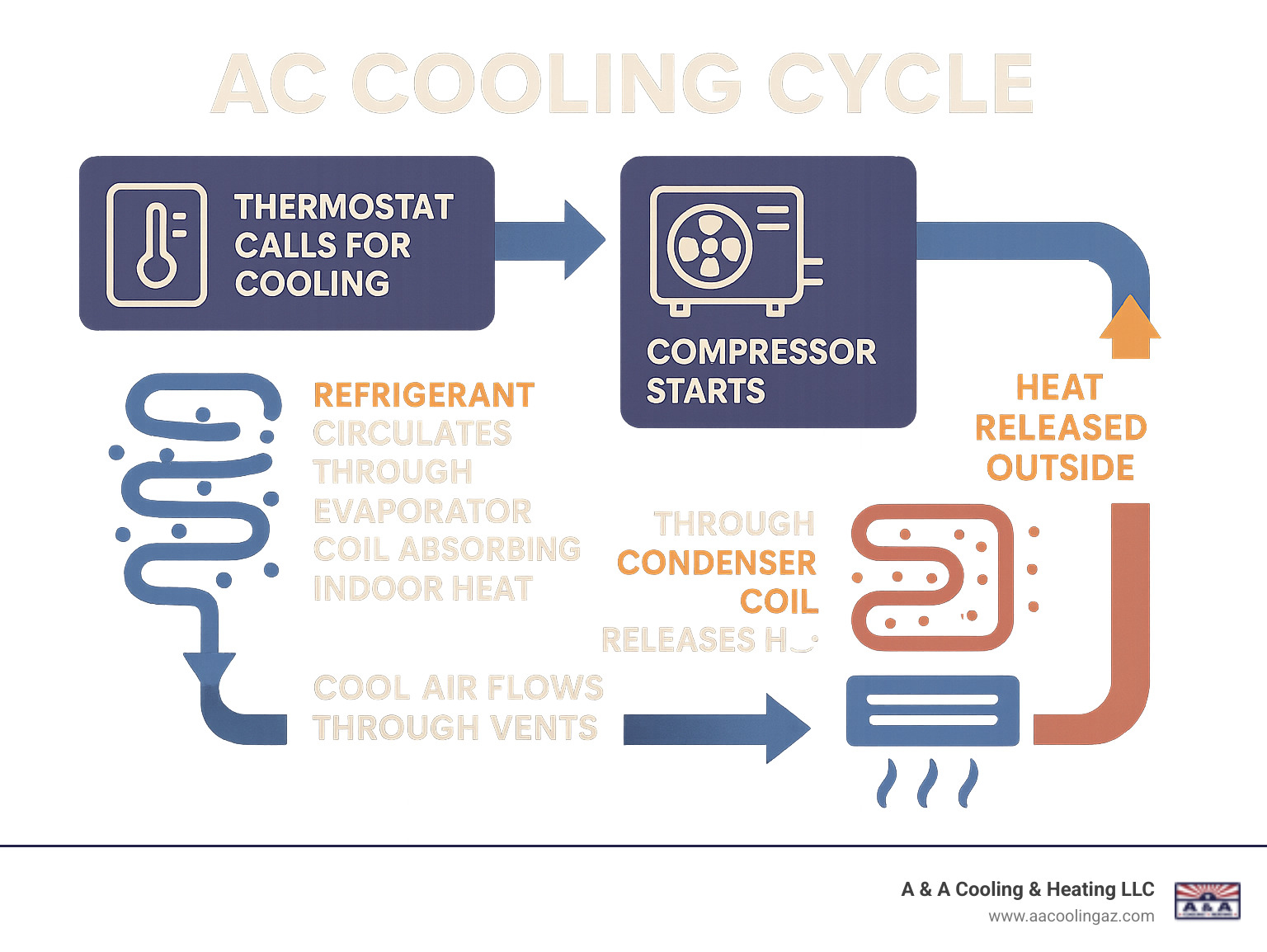
Understanding Your AC Compressor: The Heart of Your Cooling System
Think of your AC compressor as the hardworking heart of your cooling system. Just like your heart pumps blood through your body, the compressor pumps refrigerant through your air conditioning system to keep your Apache Junction home comfortable during those scorching Arizona summers.
You'll find this crucial component tucked away in your outdoor unit, where it works around the clock during cooling season. The compressor's main job is circulating refrigerant throughout your entire AC system, but it does much more than just move fluid around.
Here's how this cooling magic happens: Refrigerant starts as a liquid that flows through your indoor evaporator coil. As warm air from your house passes over this coil, the refrigerant absorbs the heat and transforms into a low-pressure gas.
The compressor then takes over, literally squeezing these gas molecules together under tremendous pressure. This compression process heats up the refrigerant even more, creating a high-pressure, high-temperature gas that carries all that unwanted heat from your home.
This super-heated gas then travels to your outdoor condenser coil, where Arizona's outdoor air (believe it or not) helps cool it down and release the heat. The refrigerant condenses back into a liquid and heads inside to start the whole process over again. It's a beautiful cycle of heat transfer that keeps your family comfortable while temperatures outside climb past 110°F.
When properly maintained, your compressor should serve you faithfully for 10 to 15 years. That's a pretty impressive lifespan for a component that works so hard! However, this longevity depends heavily on regular maintenance. Skip those annual tune-ups, and you might find yourself dealing with an AC compressor not working situation much sooner than expected.
Common Warning Signs of a Failing Compressor
Your AC compressor rarely fails without warning. Like a good friend, it usually tries to tell you something's wrong before it completely gives up on you. Learning to recognize these warning signs can save you from a complete system breakdown during the worst possible time.
Warm air blowing from your vents is often the first sign homeowners notice. You set the thermostat to a comfortable 75°F, but the air coming out feels more like a gentle breeze than the cool relief you're expecting. This happens when your compressor can't properly compress the refrigerant anymore.
Strange noises from your outdoor unit deserve immediate attention. Grinding or squealing sounds often mean the internal bearings are wearing out. Loud buzzing when the unit tries to start usually points to electrical problems or a compressor that's seizing up. Repeated clicking without the compressor actually starting indicates issues with the start relay or electrical components.
You might notice your outdoor unit shaking violently when it tries to start up. This isn't normal and often signals internal compressor problems or mounting issues that need professional attention.
Circuit breakers tripping frequently is your electrical system's way of protecting your home from a struggling compressor that's drawing too much power. If you find yourself repeatedly resetting the breaker for your AC unit, don't ignore this warning sign.
Fluid leaks around your outdoor unit, especially oily residue, could indicate refrigerant leaks or compressor oil problems. Any visible leakage deserves a professional inspection.
Reduced airflow from your vents might seem like a minor annoyance, but it can sometimes indicate a compressor that's not maintaining proper system pressure. While dirty filters cause this more often, it's worth investigating if you've recently changed your filter.
Ice buildup on the refrigerant lines leading to your outdoor unit is a serious red flag. This usually means low refrigerant levels, which forces your compressor to work much harder than it should and can lead to complete failure.
Don't brush off these warning signs. Catching compressor problems early often means the difference between a manageable repair and a complete system replacement during the peak of Arizona's brutal summer heat.
Why Is My AC Compressor Not Working? Common Causes Explained
When your AC compressor not working leaves you sweating in Arizona's relentless heat, there's almost always a specific culprit behind the breakdown. The good news? Many of these failures are actually preventable with proper care and attention.
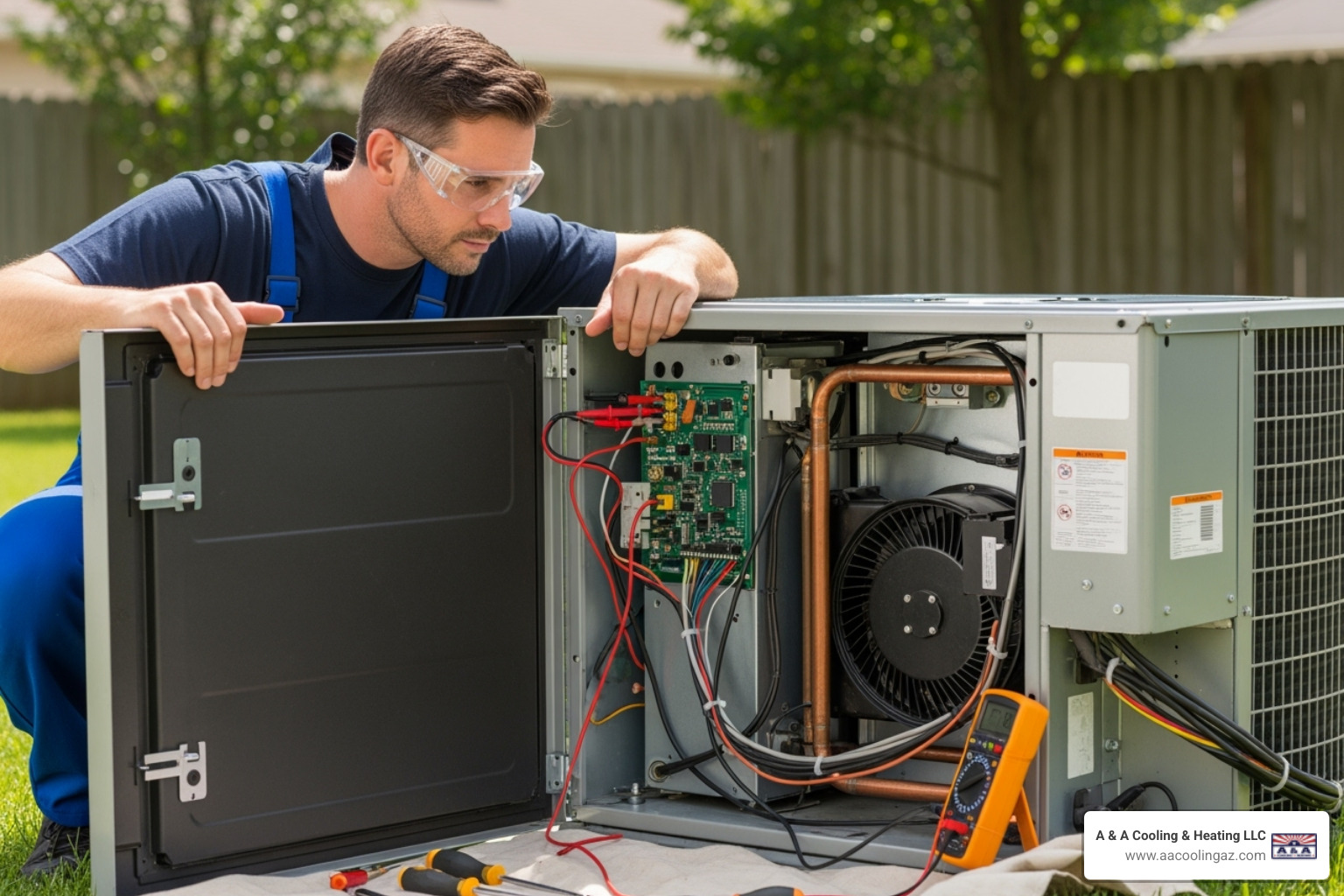
Think of your compressor like a hardworking athlete. Just as an athlete needs clean air, proper hydration, and the right equipment to perform, your compressor needs clean components, adequate refrigerant, and functioning electrical parts to do its job.
Dirty condenser coils are one of the biggest troublemakers we see. These coils in your outdoor unit act like a car radiator, releasing heat from your home to the outside air. When they're clogged with dirt, dust, cottonwood fluff, or desert debris, they can't release heat properly. Your poor compressor has to work overtime trying to cool your home, like trying to run a marathon while wearing a winter coat. Eventually, it overheats and gives up.
Blocked suction lines create another common headache. These lines carry low-pressure refrigerant gas back to your compressor. When they're restricted or blocked, your compressor can't draw in the refrigerant it needs to function properly. It's like trying to breathe through a straw – exhausting and ultimately damaging.
Lack of lubrication is a silent killer for compressors. The refrigerant flowing through your system carries a small amount of oil that keeps your compressor's moving parts running smoothly. When refrigerant levels drop due to leaks, or when there's an oil problem, your compressor starts running dry. The resulting friction quickly destroys internal components.
Finally, system strain encompasses many factors that push your compressor beyond its limits. An undersized unit constantly battling extreme temperatures, clogged air filters forcing the system to work harder, or other failing components all create excessive stress that can push your compressor past its breaking point.
Electrical Problems: The Usual Suspects
More often than not, when we get calls about an AC compressor not working, electrical gremlins are the real villains. These problems don't just prevent your compressor from starting – they can cause serious damage if left unchecked.
Capacitor failure tops our list of electrical culprits. Think of capacitors as the "starter battery" for your compressor and fan motor. Your system typically has both a start capacitor that provides the initial electrical jolt to get things moving, and a run capacitor that helps maintain smooth operation. When a capacitor fails, you might hear a buzzing sound as your compressor tries desperately to start but can't quite make it happen. Sometimes, the unit just sits there silently, leaving you wondering what's wrong.
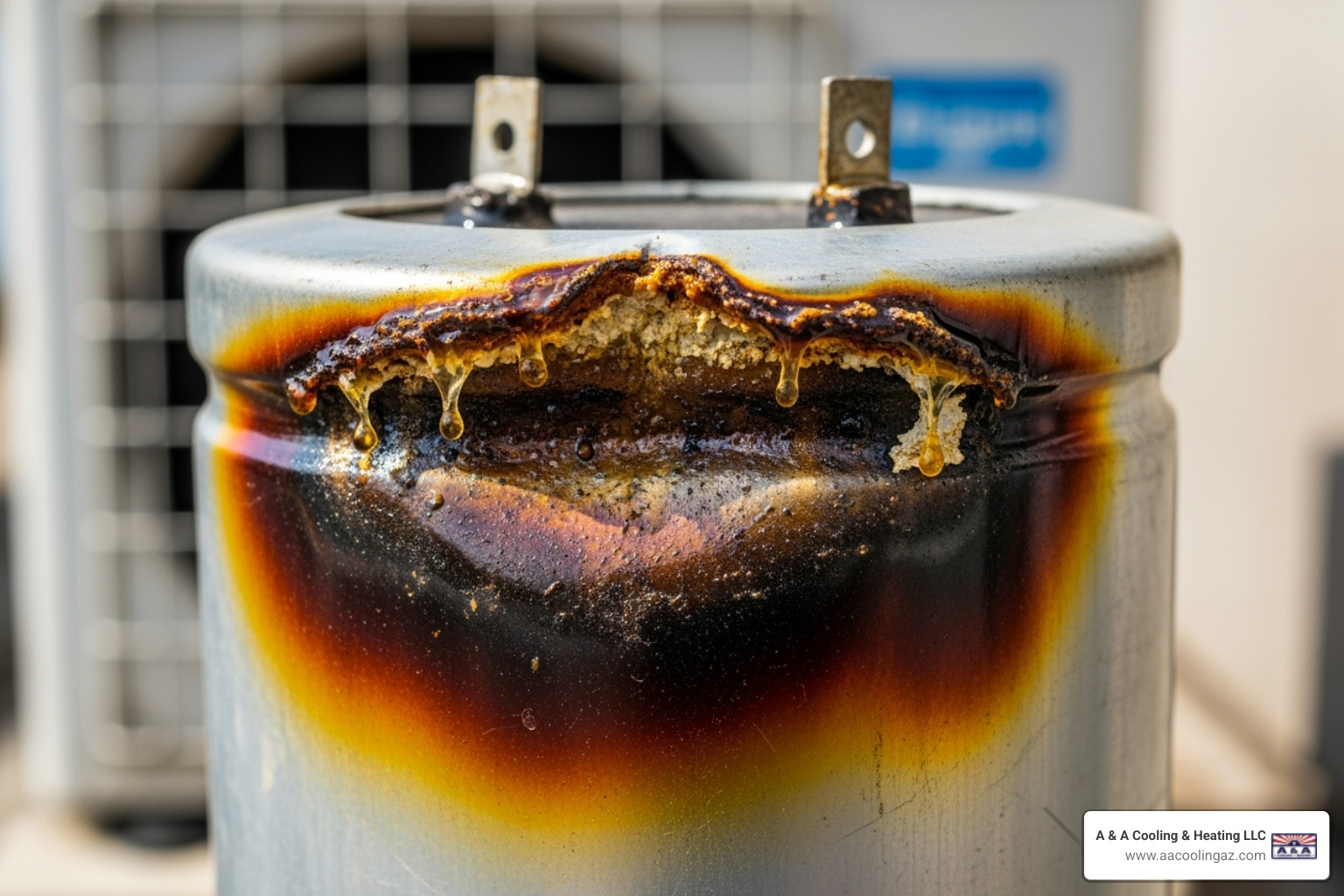
Blown fuses and tripped circuit breakers are among the simplest issues to check, yet they're surprisingly common. Your outdoor unit has its own dedicated circuit breaker in your home's electrical panel, plus sometimes an additional fuse within the unit itself. Power surges, electrical shorts, or a compressor drawing too much current can all cause these safety devices to trip. While resetting a breaker might get you running temporarily, frequent tripping usually signals a deeper problem.
The faulty contactor is another frequent troublemaker. This component acts like a heavy-duty electrical switch, controlled by the low-voltage signal from your thermostat. When your thermostat calls for cooling, the contactor closes, allowing high-voltage power to flow to your compressor and outdoor fan. If the contactor's contacts are dirty, burned, or damaged, power can't reach your compressor no matter what your thermostat is trying to tell it to do.
Wiring issues might seem straightforward, but they're surprisingly common in Arizona's harsh climate. Loose connections, corroded terminals, or damaged wires can interrupt the electrical pathway to your compressor. Sometimes these problems develop gradually, causing intermittent issues that are frustrating to diagnose.
Motor overload protection is actually a good thing – when it works correctly. Your compressor's motor has a built-in thermal protector that shuts things down if the motor gets too hot. This prevents permanent damage from overheating. However, if this protector keeps tripping repeatedly, it's telling you there's a serious underlying problem that needs professional attention. A seized or "locked up" compressor will try to start, draw excessive power, overheat quickly, and often indicates the compressor has reached the end of its useful life.
Refrigerant Issues and Pressure Problems
Refrigerant problems are serious business when it comes to AC compressor not working issues. Since refrigerant is essentially the blood flowing through your AC system's veins, any imbalance directly impacts your compressor's ability to do its job.
Low refrigerant levels are almost always caused by leaks somewhere in your system. Here's something important to understand: your AC system is a closed loop, meaning refrigerant should never be "used up" or consumed. If levels are low, there's definitely a leak that needs to be found and fixed. When refrigerant runs low, your system can't absorb enough heat from your home, forcing the compressor to work harder and harder trying to achieve the impossible. This often triggers the low-pressure safety switch, which shuts down the compressor to protect it from damage.
On the flip side, an overcharged system can be just as destructive as one that's low on refrigerant. Too much refrigerant creates dangerously high pressures that put enormous strain on your compressor. This is why those DIY refrigerant recharge kits you see at auto parts stores are often more harmful than helpful – they lack the precision needed to add exactly the right amount.
Your AC system has built-in guardians called high-pressure and low-pressure switches that monitor refrigerant pressure and protect your expensive compressor. The low-pressure switch watches the suction side of your compressor, typically shutting things down if pressure drops below 40 psi. The high-pressure switch monitors the discharge side, stopping operation if pressure climbs above 450 psi. You can learn more about understanding pressure measurements (psi) and why these numbers matter.
When these switches trip repeatedly, they're trying to tell you something important: there's a serious problem that needs professional diagnosis and repair. While the switches are doing their job protecting your compressor, the underlying issue – whether it's a leak, blockage, dirty coils, or overcharging – won't fix itself.
DIY Troubleshooting Steps Before You Call a Pro
When your AC suddenly stops working in Arizona's brutal heat, your first instinct might be to grab some tools and dive in. We completely understand that urgency! While we always recommend professional help for complex issues, there are a few safe, basic steps you can take that might get your system running again.
But here's the thing – safety absolutely comes first. Your AC unit deals with high-voltage electricity (we're talking 240 volts that can seriously hurt you) and pressurized refrigerant that requires special certifications to handle legally. If you feel uncomfortable or unsure at any point, please stop and give us a call. It's simply not worth the risk.
Also, never attempt to handle refrigerant yourself. This isn't just a safety issue – it's actually illegal without proper certification, and the specialized tools required aren't something most homeowners have lying around.
Basic Checks for an AC Compressor Not Working
Before you pick up the phone, here are some simple checks that might solve your AC compressor not working problem:
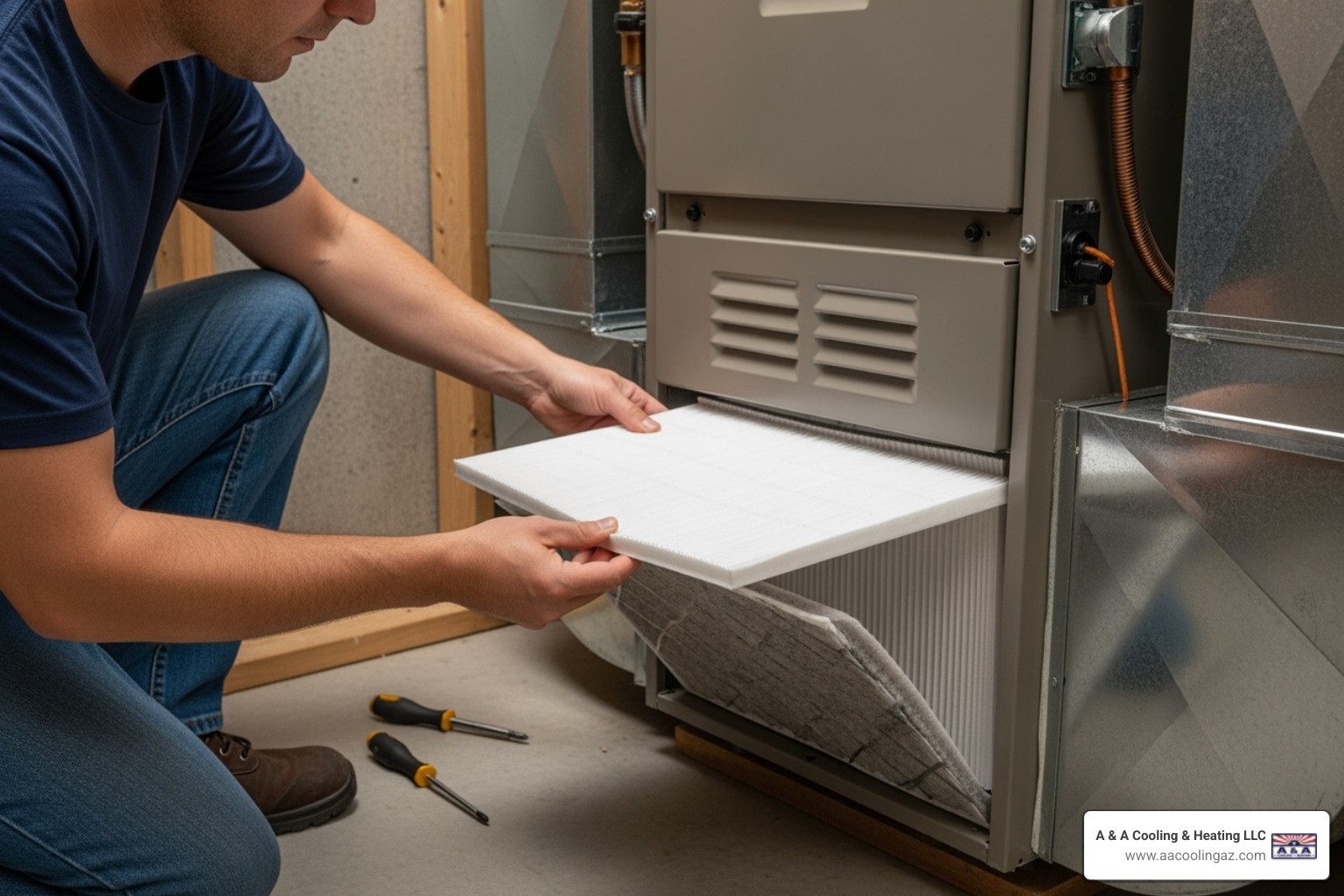
Start with your thermostat settings. This might sound too obvious, but you'd be surprised how often this is the culprit! Make sure it's actually set to "Cool" and that the temperature is set lower than what your home currently reads. Check that the fan is on "Auto" rather than "On" – if it's stuck on "On," the fan will run constantly even when the compressor isn't working, which can be misleading. If your thermostat uses batteries, pop in some fresh ones while you're at it.
Next, head to your electrical panel and look for the breaker labeled "AC," "Air Conditioner," or something similar. If it's flipped to "Off" or sitting in that halfway "Tripped" position, flip it completely off first, then firmly back to "On." If it immediately trips again, don't force it – that's telling you there's a serious electrical problem that needs our attention. Also, check the disconnect switch near your outdoor unit to make sure it's in the "On" position.
Your air filter deserves attention too. A clogged filter doesn't just hurt your air quality – it can actually cause your evaporator coil to freeze up, which triggers low-pressure switches that shut down your compressor for protection. We recommend checking your filter monthly and replacing it every one to three months, depending on your home's conditions.
Take a walk outside to your condenser unit. Over time, leaves, grass clippings, dirt, and other debris love to collect on those delicate coil fins, blocking the airflow your system desperately needs. First, turn off power to the unit at the disconnect switch for safety. Then gently clear away visible debris and carefully rinse the coils with your garden hose. Just be gentle – those fins bend easily and are expensive to repair.
Finally, become a detective with your ears. Turn your AC back on and listen carefully to your outdoor unit. A faint buzzing sound without the compressor actually starting often points to a failed capacitor. Clicking sounds without any fan or compressor action might indicate a contactor problem. Complete silence could mean a power issue or, unfortunately, a completely failed compressor.
When to Stop: Why DIY Repair for an AC Compressor Not Working Can Be Dangerous
Here's where we need to have a serious conversation. While those basic checks we just covered are generally safe for homeowners, there's a clear line where DIY troubleshooting needs to end and professional expertise becomes essential.
Refrigerant handling is absolutely off-limits for anyone without proper certification. This isn't us being overprotective – refrigerant can cause severe frostbite if it touches your skin, and releasing it into the environment is illegal due to its impact on our ozone layer and climate. Our certified technicians have specialized equipment to safely recover, recycle, and recharge refrigerant without any harmful chemicals escaping into the atmosphere.
The electrical dangers are very real. Your outdoor unit operates on 240 volts, which can be lethal. Even when you think you've turned everything off, components like capacitors can hold a charge that'll give you a shock you'll never forget – if you're lucky enough to remember it. Without proper training and safety equipment, working with these electrical components is like playing Russian roulette.
Proper diagnosis requires specialized tools that most homeowners simply don't have. We use multimeters to test electrical components like capacitors and contactors, plus pressure gauges to check refrigerant levels accurately. More importantly, interpreting these readings correctly takes years of training and experience. What looks like one problem to an untrained eye might actually be symptoms of something completely different.
Your warranty protection matters too. Many AC manufacturers will void their warranties if uncertified individuals attempt repairs. What might seem like a simple fix could end up costing you thousands in replacement costs if it voids your manufacturer's warranty coverage.
The "oops" factor is expensive. A misdiagnosis or incorrect repair can easily turn a minor problem into a major catastrophe. We've seen homeowners accidentally destroy perfectly good compressors by incorrectly wiring a capacitor or overcharging their system. When you're dealing with Arizona heat, it's just not worth the risk.
If your basic checks don't solve the problem, or if you suspect electrical issues, refrigerant leaks, or internal mechanical failures, that's when our team at A & A Cooling & Heating LLC steps in. We've got the expertise, tools, and certifications to safely diagnose and repair your AC compressor not working issues, getting your home comfortable again without putting anyone at risk.
Repair or Replace? Making the Right Decision for Your System
When you're dealing with an AC compressor not working, you'll face one of the toughest decisions homeowners encounter: should you repair your current system or bite the bullet and replace it entirely? It's a bit like deciding whether to fix that old car that's been faithful for years or finally trade it in for something new and reliable.
This decision isn't one-size-fits-all, and frankly, it shouldn't be rushed. Several key factors can help guide you toward the choice that makes the most sense for your home, your budget, and your peace of mind.
Age is often the biggest factor in this decision. If your AC system is less than 8 years old, repair usually makes sense, especially if it's still under warranty. These systems typically have plenty of life left in them, and a compressor replacement can give you many more years of reliable cooling. However, if your system is pushing 12-15 years or older, replacement often becomes the wiser long-term investment.
Warranty status can be a game-changer in your decision-making process. If your compressor is still under manufacturer warranty, repair becomes much more attractive since you'll only pay for labor. But if the warranty has expired, you're looking at the full expense of parts and labor, which can add up quickly.
The severity of the damage also plays a crucial role. A simple capacitor replacement or electrical repair? That's usually a no-brainer for repair. But if your compressor has suffered internal mechanical failure, seized up completely, or if multiple major components are failing simultaneously, replacement often makes more financial sense.
Energy efficiency is another compelling factor to consider. Newer AC units are significantly more efficient than models from even 10 years ago. If your current system has been struggling with high energy bills, a new high-efficiency unit might actually pay for itself over time through reduced utility expenses.
Long-term reliability matters too, especially in Arizona's demanding climate. A patched-up older system might get you through this summer, but what about next year? Or the year after? Sometimes investing in a new system provides the peace of mind that comes with knowing your cooling is dependable for years to come.
Here's a helpful way to think about it: if the repair costs more than half of what a new system would run you, replacement is usually the smarter move. Additionally, if you've had multiple repair calls in recent years, your aging system might be telling you it's time to retire.
At A & A Cooling & Heating LLC, we've been helping Apache Junction families make these tough decisions since 1976. We'll never pressure you into a sale – instead, we'll give you honest, straightforward advice about what makes the most sense for your specific situation. Sometimes that means a simple repair, and sometimes it means investing in your home's future comfort with a new system.






